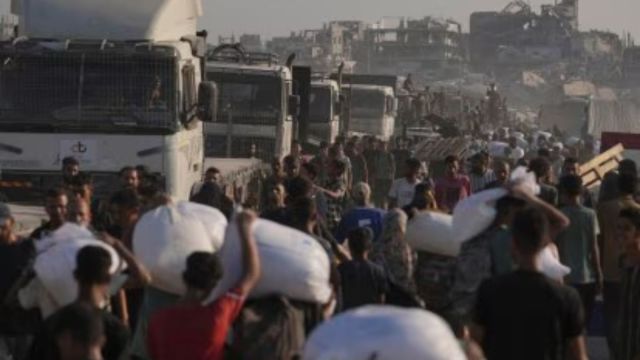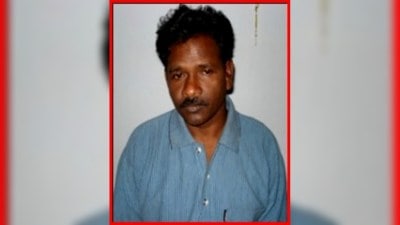Stay updated with the latest - Click here to follow us on Instagram
As famine grips civilians in Gaza, Hamas refuses to disarm without Palestinian state
Israel has long made Hamas' disarmament a non-negotiable condition in any agreement to end hostilities.
 Aid groups say hunger is worsening. Medics in Gaza report dozens of recent deaths from malnutrition. (AP Photo)
Aid groups say hunger is worsening. Medics in Gaza report dozens of recent deaths from malnutrition. (AP Photo)Indirect ceasefire negotiations between Hamas and Israel have once again ended in a deadlock as both sides remain entrenched in their positions over core demands, while humanitarian conditions in Gaza continue to deteriorate rapidly.
Last week, talks aimed at brokering a 60-day truce and a potential hostage-release agreement failed to yield progress. Qatar and Egypt, who are mediating the negotiations, recently endorsed a joint declaration by France and Saudi Arabia outlining steps toward a two-state solution. The proposal included a demand that Hamas relinquish its weapons to the Palestinian Authority, a move that Hamas firmly rejected.
In a statement released Saturday, Hamas reiterated it would not disarm unless an “independent, fully sovereign Palestinian state with Jerusalem as its capital” is established. Hamas asserted that it cannot surrender its right to “armed resistance” without a fundamental political resolution, Reuters reported.
Israel has long made Hamas’ disarmament a non-negotiable condition in any agreement to end hostilities. Israeli Prime Minister Benjamin Netanyahu recently described the idea of a Palestinian state as a “threat to Israel’s security”, insisting that military control over Palestinian territories must remain in Israeli hands.
He also denounced efforts by countries like the UK and Canada to recognise Palestinian statehood as a response to the war’s devastation, calling such moves a “reward for Hamas.”
The recent conflict began after Hamas-led militants attacked southern Israel on October 7, 2023, killing around 1,200 people and taking 251 hostages. Since then, Israel’s military response has transformed much of Gaza into a wasteland, killing more than 60,000 Palestinians, according to Palestinian authorities, and triggering what the UN now confirms is a full-scale famine.
‘Worst-case scenario of famine’
The dire humanitarian toll in Gaza was underscored this week by official recognition from the Integrated Food Security Phase Classification (IPC) panel, a coalition of UN and aid agencies. In a stark warning, the IPC declared that “the worst-case scenario of famine is currently playing out in the Gaza Strip” and called for a ceasefire to prevent further “catastrophic human suffering.”
Jamil Mughari, a 38-year-old resident of Maghazi in central Gaza, told The Guardian that his children have “lost nearly half of their body weight.”
“My daughter, who is five years old, now weighs only 11 kg. My son Mohammad has become just skin and bones,” he said. “I myself used to weigh 85kg, and now I’m down to 55.”
 Fadi and Abeer Sobh cook lentil soup in their tent at a camp for displaced Palestinians in Gaza City, Thursday, July 24, 2025. (AP Photo/Jehad Alshrafi)
Fadi and Abeer Sobh cook lentil soup in their tent at a camp for displaced Palestinians in Gaza City, Thursday, July 24, 2025. (AP Photo/Jehad Alshrafi)
Mughari described collapsing from exhaustion while searching for food. His family, displaced seven times since the war began, survives on sporadic meals of lentils and water. “We don’t receive any food aid from soup kitchens. Those are only for certain camps, in small quantities,” he said.
Food distribution remains chaotic and dangerous. The Gaza Humanitarian Foundation, which operates four food distribution sites, opens for only minutes a day, drawing massive crowds. Mourners have carried away bodies of civilians killed while trying to reach aid trucks entering Gaza through the Zikim crossing.
In a conversation with The Guardian, Mansoura Fadl al-Helou, a 58-year-old widow, said she is too frail to reach food lines and won’t allow her son to go, fearing he won’t come back alive. “Only my one son is here, but I always stop him from going near the aid trucks because of the danger posed by the army.”
 Palestinians carry sacks of flour taken from a humanitarian aid convoy en route to Gaza City, in the outskirts of Beit Lahiya, northern Gaza Strip, Friday, Aug. 1, 2025. (AP Photo/Jehad Alshrafi)
Palestinians carry sacks of flour taken from a humanitarian aid convoy en route to Gaza City, in the outskirts of Beit Lahiya, northern Gaza Strip, Friday, Aug. 1, 2025. (AP Photo/Jehad Alshrafi)
Abu al-Abed, a father of seven from Deir al-Balah, described his youngest daughter as so malnourished that her ribcage bones are visibly protruding. “They suffer from dizziness and fatigue because of the lack of food. If I, their father, feel this way, how much worse must it be for them?”
He said he had lost faith in the global response. “If we had asked them to protect the rights of animals in Gaza, they would have responded immediately. But when it comes to the rights of the Palestinian people, no one remembers us or feels for us.”
(With inputs from The Guardian and Reuters)





- 01
- 02
- 03
- 04
- 05

























